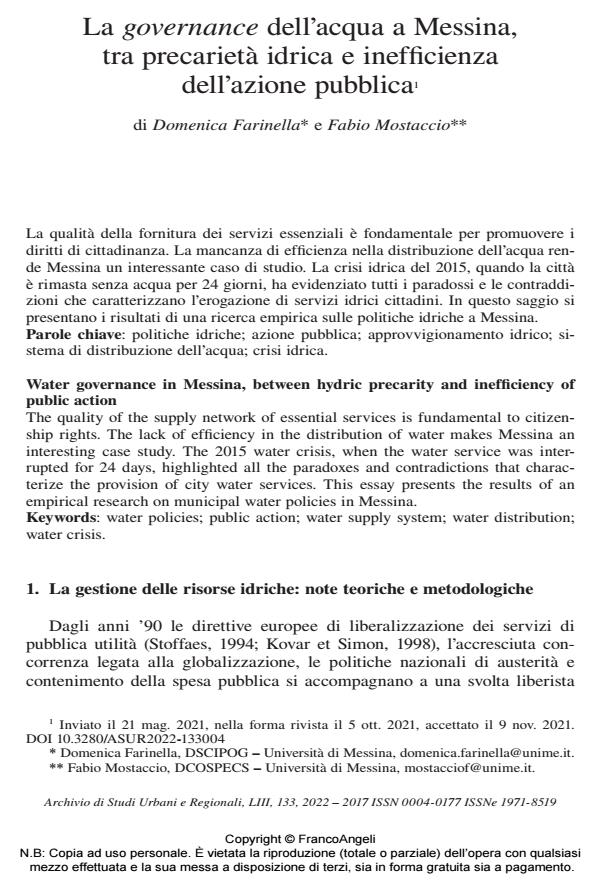Water governance in Messina, between hydric precarity and inefficiency of public action
Journal title ARCHIVIO DI STUDI URBANI E REGIONALI
Author/s Domenica Farinella, Fabio Mostaccio
Publishing Year 2022 Issue 2022/133 Language Italian
Pages 22 P. 82-103 File size 139 KB
DOI 10.3280/ASUR2022-133004
DOI is like a bar code for intellectual property: to have more infomation
click here
Below, you can see the article first page
If you want to buy this article in PDF format, you can do it, following the instructions to buy download credits

FrancoAngeli is member of Publishers International Linking Association, Inc (PILA), a not-for-profit association which run the CrossRef service enabling links to and from online scholarly content.
The quality of the supply network of essential services is fundamental to citizenship rights. The lack of efficiency in the distribution of water makes Messina an interesting case study. The 2015 water crisis, when the water service was interrupted for 24 days, highlighted all the paradoxes and contradictions that characterize the provision of city water services. This essay presents the results of an empirical research on municipal water policies in Messina.
Keywords: water policies; public action; water supply system; water distribution; water crisis.
- Froud J., Moran M., Sukhedev J., Salento A. and Williams K. (2018). Foundational Economy. The Infrastructure of Everyday Life. Manchester: Manchester University Press.
- Bakker K. (2003), Good Governance in Restructuring Water Supply: A Handbook. Federation of Canadian Municipalities. -- Testo disponibile al sito: http://gmf.fcm.ca/files/Capacity_Building_-_Water/Good_Governance_v33.pdf.
- Barbera F., Dagnes J., Salento A. e Spina F. (2016). Il capitale quotidiano. Roma: Donzelli.
- Barbera F. and Jones I.R. (2020). The Foundational Economy and Citizenship: Comparative Perspectives on Civil Repair. Bristol: Policy Press.
- Bentham J., Bowman A., de la Cuesta M., Engelen E., Ertürk I., Folkman P., Froud J., Johal S., Law J., Leaver A., Moran M. and Williams K. (2013). Manifesto for the Foundational Economy. CRESC Working Paper 131. Manchester: University of Manchester – Centre for Research on Socio-Cultural Change (CRESC) 20. -- Testo disponibile al sito: www.cresc.ac.uk/publications/manifesto-for-the-foundational-economy.
- Calapso P. (2015). Crisi idrica a Messina: chi sono i responsabili? Messina: Associazione Terra Nostra Messina. -- Testo disponibile al sito: www.blogautsicilia.wordpress.com/2015/10/29/crisi-idrica-a-messina-chi-sono-i-responsabili.
- Centorrino M. e Pira F. (2015). #Messinasenzacqua: un caso di non comunicazione di crisi. Humanities, IV(8): 17-40.
- Chavez D. (2005) (ed.). Beyond the Market: the future of public service. Public Service Yearbook 2005/6. Amsterdam: Transnational Institute.
- Cordato R.E. (1997). Market-Based Environmentalism and the Free Market. They’re Not the Same. The Independent Review, I(3): 371-386.
- De Certeau M. (1990). L’invention du quotidien. 1 – Arts de faire. Paris: Gallimard.
- Donolo C. (2001). Disordine. Roma: Donzelli.
- Eckersley R. (1993). Free market environmentalism: Friend or foe? Environmental Politics, 2(1): 1-19. DOI: 10.1080/0964401930841406
- Farinella D. and Saitta P. (2019). The Endless Reconstruction and Modern Disasters: The Management of Urban Space through an Earthquake – Messina, 1908-2018. New York: Palgrave MacMillan.
- Fraschilla A. (2017). Sicilia, il grande affare dell’acqua più cara d’Italia: il business da 2,7 miliardi di euro. la Repubblica di Palermo, 19 maggio.
- Froud J., Moran M., Sukhedev J., Salento A. e Williams K. (2019). Economia Fondamentale. L’infrastruttura della vita quotidiana. Torino: Einaudi.
- Galatà D. (1995). I cento anni dell’acquedotto di Messina, 1895-1995. Comune di Messina.
- Marotta S. and Spina F. (2020). Civil society and the movement for public water. Water management and its transformation in England and Italy. In: Barbera F. and Jones I.R., eds., The Foundational Economy and Citizenship. Bristol: Policy Press.
- McDonald D.A. (2018a). Remunicipalisation: The future of water services? Geoforum, 91: 47-56.
- McDonald D.A. (2018b). Innovation and new public water. Journal of Economic Policy Reform, 21: 1-16. DOI: 10.1080/17487870.2018.154141
- McDonald D.A. (2019). Finding common(s) ground in the fight for water remunicipalization. Community Development Journal, 54(1): 59-79.
- Mehta L. (2004). Financing water for all: behind the border policy convergence in water management. IDS Working Paper, 233: 1-37. -- Testo disponibile al sito: https://opendocs.ids.ac.uk/opendocs/bitstream/handle/20.500.12413/4072/Wp233.pdf?sequence=1&isAllowed=y.
- Modica M. (2015). Messina senz’acqua, il Comune “episodi di sciacallaggio”. la Repubblica di Palermo, 10 novembre.
- Nardi P. (2011). Tertium datur nel servizio idrico integrato? Verso un nuovo paradigma di business delle utilities del settore. Economia dei servizi, 2. DOI: 10.2382/35526
- Osservatorio Prezzi e Tariffe (2019). I costi del Servizio Idrico Integrato, 14° Indagine dell’Osservatorio prezzi e tariffe di Cittadinanzattiva. Roma.
- Parrinello G. (2015). Fault Lines. Earthquakes and Urbanism in Modern Italy. New York and Oxford: Berghahn.
- Rossi G. (2018). La governance globale delle risorse idriche. Munera, 1.
- Spina F. (2016). La distribuzione dell’acqua. In: Barbera F., Dagnes J., Salento A. e Spina F., a cura di, Il capitale quotidiano. Roma: Donzelli.
- Stoffaes C. (1994) (sous la direction de). L’Europe à l’épreuve de l’intérêt général. Paris: Éditions ASPE europe.
- Ullo P. (2013). La via dell’acqua. Messina: Libreria Ciofalo Editore.
- AMAM (2006). Relazione sullo stato delle attività dell’AMAM. Messina.
- AMAM (2018). Piano industriale. Programma Operativo triennale 2019-2021. Messina.
- Guerini A. and Romano G. (2014). Water Management in Italy. Governance, Performance and Sustainability. Cham: Springer.
- ISTAT (2015). Perdite idriche dalle reti di distribuzione dell’acqua potabile per regione. -- Testo disponibile al sito: www.istat.it.
- Kovar R. et Simon D. (1998) (sous la direction de). Service Public et Communauté européenne: entre l’intérêt général et le marché, Tome II. Paris: La Documentation Française.
- Mattei U. (2011). Beni comuni. Un manifesto. Roma-Bari: Laterza.
- Marotta S. (2011). La depubblicizzazione dei servizi idrici. Dalla municipalizzazione all’obbligo di esternalizzazione. Munus, 1: 178-197.
- Marotta S. (2019), Le forme dell’acqua. Economia e politiche del diritto nella gestione delle risorse idriche. Napoli: Editoriale Scientifica.
Domenica Farinella, Fabio Mostaccio, La governance dell’acqua a Messina, tra precarietà idrica e inefficienza dell’azione pubblica in "ARCHIVIO DI STUDI URBANI E REGIONALI" 133/2022, pp 82-103, DOI: 10.3280/ASUR2022-133004